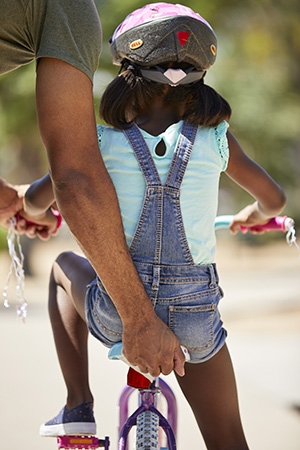By University of Arizona College of Medicine-Tucson Department of Psychiatry Physicians Jessie Rice, M.D., Integrative Psychiatry Fellow, and Noshene Ranjbar, M.D., Assistant Professor of Psychiatry, Division Chief for Child and Adolescent Psychiatry, and Director of Integrative Psychiatry Clinic
The uncertainties of COVID-19 (the novel coronavirus) have disrupted our routines, especially for children. Schools are closed, fun activities and trips are canceled, schedules are different, childcare is disrupted, parents are stressed, parents’ work is different, and if a family member gets sick, there is the question of whether it is COVID-19 or a simple cold or flu. Children thrive on routine and predictability; this time of change may be especially trying for them. Children are looking to adults to model healthy responses to the pandemic, including practicing social distancing, dealing with economic concerns, and managing stress.
How to Talk to Your Children about COVID-19
 Foster an ongoing, open, and honest dialogue. Answer questions as they come up. For young children, focus on answering the exact question the child asked, using age-appropriate vocabulary. Let the child’s follow-up questions direct how much additional information they receive. Start by asking what they already understand about COVID-19. Children may ask the same questions repeatedly, and consistency of response and avoiding frustrated tones are key. For older children or teens, share facts with them and present the action plan to protect them and your family – and the community as a whole.
Foster an ongoing, open, and honest dialogue. Answer questions as they come up. For young children, focus on answering the exact question the child asked, using age-appropriate vocabulary. Let the child’s follow-up questions direct how much additional information they receive. Start by asking what they already understand about COVID-19. Children may ask the same questions repeatedly, and consistency of response and avoiding frustrated tones are key. For older children or teens, share facts with them and present the action plan to protect them and your family – and the community as a whole.- Reassure your child that there are things they can to reduce their risk of getting sick: washing their hands often, not touching their face, sleeping well, eating healthy foods, and avoiding people who are sick. This is an empowering message for them. Another point of reassurance is that COVID-19 is most serious for the elderly or sick people, and that children tend to have much milder cases. Reassure them that, if they do get sick, you are there to take care of them, and doctors and nurses will help too. Help them understand that we are trying to protect everyone in our community, especially grandparents and those who are sick, by staying in.
- Be honest with your child. It is okay to say, “I don’t know.” Such honesty builds trust. You and your child could look up the answer to the question together, using trusted sources (see resource list at the end of the article and see this Centers for Disease Control link). And sometimes in life, there simply isn’t an answer. We can model to our children a healthy response to uncertainty, that we do our best with the information we have.
- Encourage your child to express how they feel. Model this using emotion words to describe some of the ways you might be feeling. If emotion words are hard to come up with, focus on bodily feelings or sensations with your child. Awareness of emotions is a critical step in stress management for people of all ages. When your child expresses their emotions, listen without distractions and treat their feelings with care. Don’t dismiss or chuckle at their feelings. All feelings are welcome and taken seriously. Gently correct points of misunderstanding, but only after the child feels understood. When children express anxiety for the health of their friends and others, perhaps older relatives, validate their feelings by telling them it is normal to feel that way, and it shows how much they care. If your child does not seem to care at all about the COVID-19 pandemic, that is okay too, and encouraging (but not pushing) open dialogue within the family can help.
- For a child who is having a hard time accessing their feelings (and there are many reasons for this), help them find creative expression through non-verbal mediums. Ask them to draw coronavirus, or the COVID-19 situation in general, or their family during this difficult time. This can be appropriate for children of all ages, teens included. Put on some music, ask them if they want to choose the music, and get them dancing. This can bring feelings to the surface that might not have come up otherwise. A meditation-related activity or just deep breathing can be helpful. Some options for brief guided meditations to help with stress or anxiety that you and your child can do together include: Stop, Breath & Think Kids; Smiling Mind; Headspace; Relax Melodies; and Insight Timer. These are all apps that can be found to the Psychology Today website here.)
- Avoid expressing your own COVID-19 related fears to your child or teen. Try not to panic yourself. Keep adult-level discussions about pandemic preparedness to a minimum in front of children.
Actions to Help Your Child Cope with COVID-19
 Try to maintain your child’s routine as much as possible – or create new routines. For young children, maintain their bedtime routine as it was before. For older children and teens, a regular bedtime will preserve their sleep cycles.
Try to maintain your child’s routine as much as possible – or create new routines. For young children, maintain their bedtime routine as it was before. For older children and teens, a regular bedtime will preserve their sleep cycles.- Set up small things each day for your child to look forward to.
- Make handwashing fun for younger children by singing silly songs or using fun soaps.
- Give your child choices wherever possible to help them feel like they have a voice or some level of control, despite the difficult circumstances.
- Encourage play and staying active for all ages, even indoors in small spaces. Good quality and free YouTube videos for children can make screen time more productive. Offer to do exercises alongside your child. Avoid significantly more solo screen time than your child would have otherwise. Closely supervise media they consume.
- This time is a great opportunity to build family relationships by spending quality time together. Board games, family meals, creative crafts, reading, virtual museum visits, and family movies are examples of activities families might do together while at home.
- Be extra understanding that your child (and you too!) may be more irritable during this time. Irritability is a common expression of stress. A good response to an irritable child (once they’ve calmed down) might be, “What is really bothering you? Let’s talk about it.” For very young children, more physical affection might be helpful.
- Have your child help you choose a charity and make a donation to help those who are less fortunate during this difficult time.
- Help your teen use their own common sense about some of the sensational media reports they might come across and direct them to reliable information sources, which they can post on social media to help their friends as well.
- Limit news media consumption for children of all ages. As the parent, you are using the information you’re getting from local authorities and other trusted sources to protect your family and your community. It will be easier for your child to cope if they are not directly privy to the moment-by-moment changes and uncertainties COVID-19 brings for us all. They trust you to be their protector and their leader. We also know from previous national or international situations that viewing repeated disaster-related images on the media can be distressing for everyone, especially children. Reduce your own news media consumption to alleviate stress while staying informed.
- For children or teens who are having more trouble coping with COVID-19 than others, speak to their primary care provider about your concerns and find them a therapist after it is safe to resume activity as normal. Signs of psychiatric problems include excessive reassurance seeking, insomnia, intrusive thoughts and/or rituals, and trouble separating from parents. If your child makes any suicidal statements, and especially if you feel unsure whether or not you can keep them safe at home with close supervision, take them immediately to the closest emergency room or the Crisis Response Center, staffed 24/7 for mental health emergencies.
These practices not only will help your family cope during the current crisis, but also will help build resilience for the future. Remember that expressing love is of paramount importance, be sure to wash your hands, and don’t forget to breathe!
Additional Resources
- American Academy of Child & Adolescent Psychiatry: Talking to Children about Coronavirus (opens a PDF)
- Centers for Disease Control and Prevention: Manage Anxiety & Stress – For Parents
- Center for the Study of Traumatic Stress
- International Association for Child & Adolescent Psychiatry & Allied Professions: Surviving the Pandemic with Your Children
- Anxiety and Depression Association of America: How to Talk to Your Anxious Child or Teen About Coronavirus
- The Center for Mind-Body Medicine
- National Alliance on Mental Illness – Southern Arizona
- Psychology Today: How to Talk to Kids and Teens About the Coronavirus

